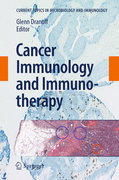
The interplay between tumors and their immunologic microenvironment is complex, difficult to decipher, but its understanding is of seminal importance for the development of novel prognostic markers and therapeutic strategies. The present review discusses tumor-immune interactions in several human cancers that illustrate various aspects of this complexity and proposes an integrated scheme of the impact of local immune reactions on clinical outcome. Current active immunotherapy trials have shown durable tumor regressions in a fraction of patients. However, clinical efficacy of current vaccines is limited, possibly because tumors skew the immune system by means of myeloid-derived suppressor cells, inflammatory type 2 T cells and regulatory T cells (Tregs), all of which prevent the generation of effector cells. To improve the clinical efficacy of cancer vaccines in patients with metastatic disease, we need to design novel andimproved strategies that can boost adaptive immunity to cancer, help overcomeTregs and allow the breakdown of the immunosuppressive tumor microenvironment. The interplay between tumors and their immunologic microenvironment is complex, difficult to decipher, but its understanding is of seminal importance for the development of novel prognostic markers and therapeutic strategies. The present review discusses tumor-immune interactions in several human cancers thatillustrate various aspects of this complexity and proposes an integrated scheme of the impact of local immune reactions on clinical outcome.
- ISBN: 978-3-642-14135-5
- Editorial: Springer
- Encuadernacion: Cartoné
- Páginas: 280
- Fecha Publicación: 31/08/2010
- Nº Volúmenes: 1
- Idioma: Inglés
